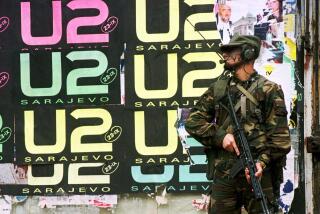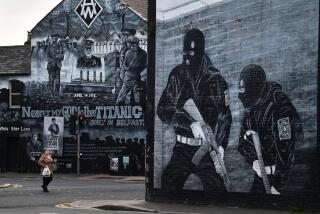COLUMN LEFT/ ALEXANDER COCKBURN : Offer the Slavs a Carrot Before Using the Stick : Economic integration with Europe is the only solution to ethnic-religious factionalism.
ARDMORE, Ireland — Suppose all agreements and negotiations to end bloodshed in Bosnia break down. Then the war party in the United States and Europe may well prevail. But what do these interventionists--often liberals and (in Europe) Social Democrats--want? At the gut level, it is to teach the Serbs a lesson. This could be done in three ways:
About 90,000 NATO troops could be sent in, with air cover. From the point of view of Western political leaders, the disadvantage of this plan is that some of these troops would be killed, losing their lives in the cause of a murky objective.
The Serbs might be rolled back from portions of Bosnia, with the Muslims being mustered into “safe havens.” But then Serbia might strike back in the provinces of Kosovo or Macedonia. Either of these attacks might excite a response by neighbors such as Albania or Greece. Another consideration is that an attack on Serbia could provoke Pan-Slavic nationalists in Russia, and in the Russian Army, to come to the Serbs’ rescue.
The prospect of substantial casualties in a war with no clear objective or terminus inclines the Western governments to the notion of a more limited intervention, in the form of air strikes.
Such a strategy would undoubtedly kill people but would not necessarily loosen Serbian military control over 70% of Bosnia. The Serbs would probably deploy their guns in well-populated areas. The bombing would expose the U.N. forces now in Bosnia to reprisals. It could lead to their enforced evacuation, precipitating further massacres.
The Western powers will therefore be urged to the war party’s third option, the arming of the Bosnian Muslims. Such arming would require Croatian help, for the Croats control much land access to Bosnia (Serbian access being beside the point in this matter).
The governments of both Bosnia and Croatia have large financial resources, the former from Saudi Arabia and other Middle Eastern states, the latter from Catholic treasuries to the north, in Germany and Austria. A Balkan arms race would ensue, with Russia speeding commensurate military assistance to the Serbs. Thus, as with the introduction of ground troops, the arming of Bosnia’s Muslims would boost both the Croat and Serbian access to fresh armaments and fuel a wider conflagration.
Those who advocate the arming of the Muslims often argue that the Bosnian government genuinely represents all confessional communities, whether Muslim or Croatian Catholics or Serbian Orthodox.
Sadly, this is no longer true. The deadly logic of ethno-religious military competition renders obsolete such claims for the multiconfessional nature of the Bosnian forces. The Bosnian government now represents only one community that, however well-armed, will not be able to impose its will on the Bosnian Croats and Serbs.
But the situation, bad though it may be, is not wholly discouraging. The U.N. forces now on the ground have established themselves as not simply a fresh belligerent element, which a NATO expedition would be. And the leaders of the three Bosnian communities have at least signed accords calling for demilitarization and a negotiated settlement.
There is still a chance of reconstructing an independent and pacific Bosnia, so long as the outside powers act with this ideal in mind. I’m writing these lines in Ireland, and a glance at Ireland’s own version of Bosnia evokes two important points.
In the end, a solution to the Northern Irish crisis will come via greater integration of both Britain and Ireland in a larger European community, with ensuing devolution within the old sovereign national framework of such regions as Ulster, Scotland or Wales.
By the same token, all former Yugoslav republics could be offered associate status in the European Community, with the promise of generous economic help conditional upon negotiations and demilitarization. One of the great accelerators of the breakup of Yugoslavia was the quest of the first separatists--Slovenia and Croatia, encouraged by Germany--to gain fast-track access to the E.C.
Looking again to Northern Ireland, suppose that instead of the British Army entering Ulster at the end of the 1960s, a U.N. peacekeeping force had arrived and, over the near-quarter-century that followed, built up a non-sectarian police force and fostered reconciliation.
In this analogy, the U.N. Protection Force in Bosnia could be encouraged to foster those local authorities in Bosnia that have been most mindful of the rights of minority communities. To this end the U.N. force could itself enroll multiconfessional auxiliary militia and police forces that, under U.N. command, would help to secure and enforce negotiated settlements and the physical security of all citizens of Bosnia.
More to Read
Sign up for Essential California
The most important California stories and recommendations in your inbox every morning.
You may occasionally receive promotional content from the Los Angeles Times.










